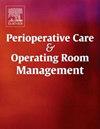Evaluation of hopelessness, decision regret and desire for retransplantation in patients with graft loss after kidney transplantation
IF 1
Q2 Nursing
Perioperative Care and Operating Room Management
Pub Date : 2025-06-15
DOI:10.1016/j.pcorm.2025.100508
引用次数: 0
Abstract
Aim
In this descriptive study, it was aimed to evaluate hopelessness, decision regret, and desire to be transplanted again in patients who developed graft loss after kidney transplantation.
Material and Method
The study sample consisted of all patients who developed graft loss after kidney transplantation between January 2017 and February 2021 in a private hospital in XXX, who met the inclusion criteria and volunteered for the study. “Patient Information Form”, ‘Beck Hopelessness Scale’ and ‘Decision Regret Scale’ were used as data collection tools in the study.
Findings
It was determined that participants experienced a moderate level of hopelessness after graft rejection (13.370 ± 4.379) while the average scores on the decision regret scale were generally high (66.435 ± 18.213). Regarding the desire to be transplanted again, it was observed that the majority of the participants (52.2 %) did not want to be transplanted again. According to the results of the correlation analysis, there was a significant correlation between hopelessness and decision regret scores (p* < 0.05) while there was no significant correlation with the desire to be transplanted again (p > 0.05). In addition, hopelessness (p = 0.034) scores of individuals who were not employed were significantly higher than those who were employed, and both hopelessness (p = 0.000) and decision regret (p = 0.048) scores of those without religious belief were significantly higher than those with religious belief.
Conclusion
The findings of the study emphasize the critical importance of monitoring and psychological support processes before and after kidney transplantation. Understanding the emotional processes individuals experience after kidney transplant graft loss is important for the development of psychological support and intervention strategies.
肾移植术后移植物丧失患者再移植无望、决定后悔和愿望的评价
在这项描述性研究中,目的是评估肾移植后出现移植物丧失的患者的绝望、后悔和再次移植的愿望。材料和方法研究样本包括2017年1月至2021年2月在XXX一家私立医院接受肾移植后出现移植物丢失的所有患者,符合纳入标准并自愿参加研究。采用“患者信息表”、“贝克绝望量表”和“后悔决策量表”作为数据收集工具。结果确定参与者在移植排斥后经历了中等程度的绝望(13.370±4.379),而决策后悔量表的平均得分普遍较高(66.435±18.213)。关于再次移植的愿望,观察到大多数参与者(52.2%)不想再次移植。相关分析结果显示,绝望与决策后悔得分之间存在显著相关(p* <;0.05),而与再次移植意愿无显著相关性(p >;0.05)。此外,未就业个体的绝望得分(p = 0.034)显著高于有就业个体,无宗教信仰个体的绝望得分(p = 0.000)和决策后悔得分(p = 0.048)显著高于有宗教信仰个体。结论本研究结果强调了肾移植前后监测和心理支持过程的重要性。了解个体在肾移植失败后经历的情绪过程对于心理支持和干预策略的发展是重要的。
本文章由计算机程序翻译,如有差异,请以英文原文为准。
求助全文
约1分钟内获得全文
求助全文
来源期刊

Perioperative Care and Operating Room Management
Nursing-Medical and Surgical Nursing
CiteScore
1.30
自引率
0.00%
发文量
52
审稿时长
56 days
期刊介绍:
The objective of this new online journal is to serve as a multidisciplinary, peer-reviewed source of information related to the administrative, economic, operational, safety, and quality aspects of the ambulatory and in-patient operating room and interventional procedural processes. The journal will provide high-quality information and research findings on operational and system-based approaches to ensure safe, coordinated, and high-value periprocedural care. With the current focus on value in health care it is essential that there is a venue for researchers to publish articles on quality improvement process initiatives, process flow modeling, information management, efficient design, cost improvement, use of novel technologies, and management.
 求助内容:
求助内容: 应助结果提醒方式:
应助结果提醒方式:


